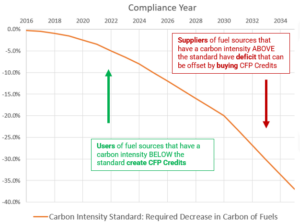The State of Oregon recently adopted updated to the Clean Fuels Program (CFP) which set the most ambitious Carbon Intensity reduction targets of any clean fuel standard in the U.S. or Canada.
These updates will drive demand for CFP credits and continue to foster innovation and fuel switching in the State.

The new CFP Standard extends the program to at least 2035 and sets goals of 37% reduction in Carbon Intensity of Transportation Fuels
Key Clean Fuels Program Updates
PineSpire has participated in the Rulemaking process for the updates to the program since day one, advocating on behalf of our customers and commercial businesses. To help you digest the changes, we’ve summarized the key updates to the program below:
- Carbon-Intensity Standard: First and foremost, the extension of the program through at least 2035, and setting more ambitious carbon reduction targets will bolster long-term certainty in the market, support ongoing demand for Credits, and bring consistency to the marketplace
- Forklift Credit Generation: The new rule updates language regarding the claim of credits for fleet owners and operators as shown below. If you have questions about what these terms mean for your fleet – contact us and we can talk through the specifics of your fleet
-
“For electricity used to power forklifts, the forklift owner may generate the credits. If the forklift is being operated by a person other than the owner, the owner may generate the credits if they have detailed data that enables them to accurately report the electricity used to operate the forklift as required by OAR 340-253-1000(2), otherwise the operator of the forklift may generate the credits.”
-
- Credit Generation for non-residential EV chargers: There is further clarification of priority of claim to credits for EV chargers at businesses or for public use. These updates make it even more important to verify the rights to CFP credits when working with any hardware installer or charger operating services.
- General Updates: Other updates to the program include changes to promote hydrogen and fast charging infrastructure, as improved rules for monitoring and enforcing violations, adding category for airport ground support equipment, and adding ocean-going vessels as eligible to participate.
What’s next for the CFP Market?
As part of the multi-year rulemaking process, the DEQ commissioned several studies on transportation fuels and the market adoption in Oregon. These studies conclude that the recent updates will drive an increase of renewable fuel options like renewable diesel and biogas as well as further adoption of EVs. All of these incentives are aligned with the regulatory requirements in Oregon, such as the Oregon Low Emission Vehicle Rule. PineSpire is here to help you put the incentive and regulatory pieces together. Reach out to us to discuss your fleet and electrification options.
